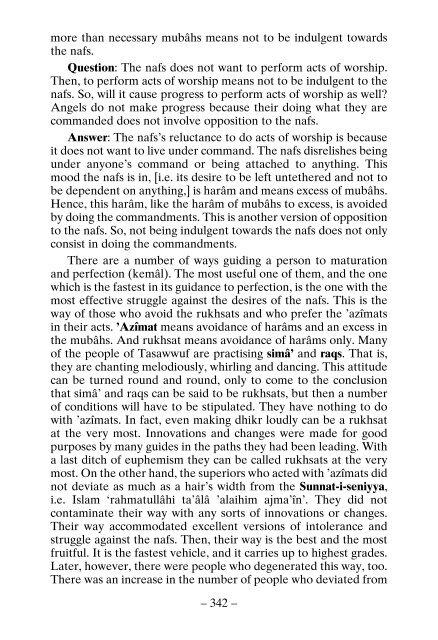O Son !
THE BOOK ‘O SON’ Al-hamdu lillâhi Rabbil ’âlamîn. Wa-s-salâtu wa-s-salâmu ’alâ Rasûlinâ Muhammadin wa Âlihi wa Sahbihi ajma’în. 1– O son! Collecting from books written by the scholars of the Hanafî Madhhab three hundred and sixty hadîth-i-sherîfs and forty-four khabars and also the seven essentials and the five rukns and the seven wâjibs and the fourteen sunnats and the twenty-five mustahabs and the fourteen mufsids of namâz, I have explained them for you. Adapt your acts and deeds to these teachings so that you attain fayz and nejât (salvation)! 2– Also for your information, I have collected a thousand and ninety âdâb (adabs) for you and for other young Muslims like you. If you adapt your actions and acts of worship to these teachings, they will be sufficient for you. If you laze, disobey Allâhu ta’âlâ and cease from these practices and manners, you will be afflicted with slavery and disgrace in the world and subjected to torment in the world to come. If you live up to them and advise your Muslim brothers to do the same, it will be useful for you. They will say blessings over you. And Haqq ta’âlâ will accept their invocations. For, a slave will be pardoned on account of another slave’s invocations for them.
THE BOOK ‘O SON’
Al-hamdu lillâhi Rabbil ’âlamîn. Wa-s-salâtu wa-s-salâmu ’alâ
Rasûlinâ Muhammadin wa Âlihi wa Sahbihi ajma’în.
1– O son! Collecting from books written by the scholars of the
Hanafî Madhhab three hundred and sixty hadîth-i-sherîfs and
forty-four khabars and also the seven essentials and the five rukns
and the seven wâjibs and the fourteen sunnats and the twenty-five
mustahabs and the fourteen mufsids of namâz, I have explained
them for you. Adapt your acts and deeds to these teachings so that
you attain fayz and nejât (salvation)!
2– Also for your information, I have collected a thousand and
ninety âdâb (adabs) for you and for other young Muslims like you.
If you adapt your actions and acts of worship to these teachings,
they will be sufficient for you. If you laze, disobey Allâhu ta’âlâ
and cease from these practices and manners, you will be afflicted
with slavery and disgrace in the world and subjected to torment in
the world to come.
If you live up to them and advise your Muslim brothers to do
the same, it will be useful for you. They will say blessings over you.
And Haqq ta’âlâ will accept their invocations. For, a slave will be
pardoned on account of another slave’s invocations for them.
You also want an ePaper? Increase the reach of your titles
YUMPU automatically turns print PDFs into web optimized ePapers that Google loves.
more than necessary mubâhs means not to be indulgent towards<br />
the nafs.<br />
Question: The nafs does not want to perform acts of worship.<br />
Then, to perform acts of worship means not to be indulgent to the<br />
nafs. So, will it cause progress to perform acts of worship as well?<br />
Angels do not make progress because their doing what they are<br />
commanded does not involve opposition to the nafs.<br />
Answer: The nafs’s reluctance to do acts of worship is because<br />
it does not want to live under command. The nafs disrelishes being<br />
under anyone’s command or being attached to anything. This<br />
mood the nafs is in, [i.e. its desire to be left untethered and not to<br />
be dependent on anything,] is harâm and means excess of mubâhs.<br />
Hence, this harâm, like the harâm of mubâhs to excess, is avoided<br />
by doing the commandments. This is another version of opposition<br />
to the nafs. So, not being indulgent towards the nafs does not only<br />
consist in doing the commandments.<br />
There are a number of ways guiding a person to maturation<br />
and perfection (kemâl). The most useful one of them, and the one<br />
which is the fastest in its guidance to perfection, is the one with the<br />
most effective struggle against the desires of the nafs. This is the<br />
way of those who avoid the rukhsats and who prefer the ’azîmats<br />
in their acts. ’Azîmat means avoidance of harâms and an excess in<br />
the mubâhs. And rukhsat means avoidance of harâms only. Many<br />
of the people of Tasawwuf are practising simâ’ and raqs. That is,<br />
they are chanting melodiously, whirling and dancing. This attitude<br />
can be turned round and round, only to come to the conclusion<br />
that simâ’ and raqs can be said to be rukhsats, but then a number<br />
of conditions will have to be stipulated. They have nothing to do<br />
with ’azîmats. In fact, even making dhikr loudly can be a rukhsat<br />
at the very most. Innovations and changes were made for good<br />
purposes by many guides in the paths they had been leading. With<br />
a last ditch of euphemism they can be called rukhsats at the very<br />
most. On the other hand, the superiors who acted with ’azîmats did<br />
not deviate as much as a hair’s width from the Sunnat-i-seniyya,<br />
i.e. Islam ‘rahmatullâhi ta’âlâ ’alaihim ajma’în’. They did not<br />
contaminate their way with any sorts of innovations or changes.<br />
Their way accommodated excellent versions of intolerance and<br />
struggle against the nafs. Then, their way is the best and the most<br />
fruitful. It is the fastest vehicle, and it carries up to highest grades.<br />
Later, however, there were people who degenerated this way, too.<br />
There was an increase in the number of people who deviated from<br />
– 342 –

















